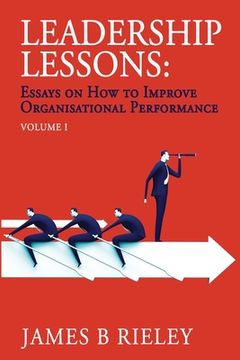Leadership Lessons: Essays on How to Improve Organisational Performance (in English)
Synopsis "Leadership Lessons: Essays on How to Improve Organisational Performance (in English)"
Leadership is a critical skill. Leadership Lessons goes straight in to deal with the real and perceived challenges leaders face to fulfil their personal and organisational potential. Written by a highly experienced leader, the exCEO of a successful company who spent over 24 years accumulating powerful insights and then went on to advise CEO's of other companies on how to realise their personal and collective organisational potential. The essays in this book are an accumulation of insights to help readers understand the real dynamics impacting their organisations. If you want to realize individual and collective potential, this book is a must read. Written as a series of short essays that are perfect for travel or breaks between meetings, topics include decision-making, organisational alignment, short and long-term strategy, crisis management, gaming the system, and building commitment. Many of the essays are in the form of questions. If we don't learn how to ask better questions, we will never get the answers we really need. Leadership Lessons can give you insights on how to move from reactive thinking to creating the personal or organisational future you want. The lessons in this book aren't just for one business sector or one organisational size or geography; Leadership Lessons applies to anyone who wishes to become more effective. Here are some examples of issues explored in this book: Too often, our beliefs and assumptions can result in us taking actions that can be anything but positive. We become distracted from the challenges we face, often, due to a belief or assumption that can be far removed from reality. We believe that a subordinate is incompetent or just not up to a task, and because of that belief, we begin to treat that person in a way that will preclude them from being able to demonstrate performance that is needed. Perhaps we believe that our boss isn't suited to lead the company, and because of this belief, we begin to lose our commitment to organisational goals and initiatives. The result in each of these examples demonstrates that often, our mental models (our beliefs and assumptions) can hurt us. - Explored in the chapter: What is the Big Deal with Mental Models The ability to work collectively toward a common goal can slip away when we become so focused on just our part of an organisational challenge. We become deluded into thinking that we are helping, when in fact, our performance efforts are creating obstacles for other parts of the business. - Explored in the chapter: Why Is It So Difficult to Get to the Finish Line? Having high expectations can be good, but sometimes, those expectations can result in horrendous unintended consequences. This is especially true when the expectations are set for performance. High performers are expected to demonstrate ever-increasing levels of high performance, and that is fine if the desired performance is supported by the organisational infrastructure, rewards, and demonstrated appreciation. - Explored in the chapter: Michelin Expectations The ability to think about the future is something that quite a few organisations struggle with. A survey by the Institute of Directors showed that 69% of survey respondents said that they were "too busy." Being "too busy" means that you will be forever mired in reactive thinking mode; you will not be able to avoid potential problems looming on the horizon; and you will lose any competitive edge. Companies go out of business because their managers are too occupied by "today" and don't take the time to even consider what "tomorrow" might bring. - Explored in the chapter: An Oncoming Train?

